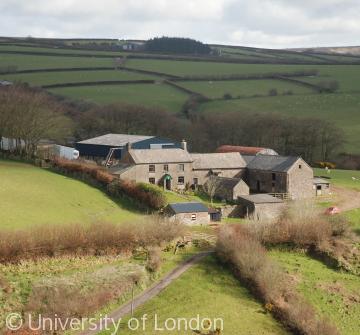Agriculture
 Lyshwell Farm, Exmoor
Lyshwell Farm, ExmoorAgriculture, often expressed simply as farming, is the business of working the land to provide food for the population. Initially settler communities lived off natural products such as meat and wild fruits and berries. Once they began to tame the land by assarting from the waste, and laying out land for cultivation, lessons had to be learnt about how to work the land for the best produce and to ensure its fertility was not worked out in such a manner as to make the land unworkable for long periods.
Upland was often used for permanent grazing because crops were poor yielding, but through the Midlands and southern and eastern England various systems were introduced to produce the maximum output over time. The best known of these was the Midland three course open field system, but there were variants of this in different parts of the south depending on soil quality and local demand. Ideally, the country sought to be self-sufficient in farm produce, and for a while in the late 17th and early 18th century there was even a net export surplus to Europe.
By the later decades of the 18th century, the surplus had been turned into a deficit and as urbanisation proceeded (with a greater proportion of the population living in towns) food was brought in from Ireland, and Continental Europe. In the 19th century Imperial preference was used to favour farm imports from the Empire, but the advent of cheap forms of refrigerated transport led to prolonged depression, a flight from the land.
There was no real recovery from the agricultural depression (except briefly in wartime) until the terms of the 1947 Agriculture Act were enforced, and when the country entered the Common market in the 1960s. Under the Common Agricultural Policy (CAP) modern farmers have sometimes enjoyed favourable conditions but at other times suffered because of the subsidized competition from elsewhere in Europe, notably France.







